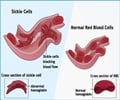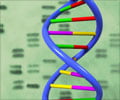A new treatment option for older, sicker patients with sickle cell disease is on the way

The transplant done in the study reversed sickle cell disease in nearly all the patients. Despite having both donor stem-cells and their own cells in their blood, the patients stopped the immunosuppressant medication without experiencing rejection or graft-versus-host disease, in which donor cells attack the recipient. Both are common, serious side effects of transplants.
"Typically, stem-cell recipients must take immunosuppressants all their lives," said Matthew Hsieh, M.D., lead author on the paper and staff clinician at NIH. "That the patients who discontinued this medication were able to do so safely points to the stability of the partial transplant regimen."
In sickle cell disease (SCD) sickle-shaped cells block blood flow. It can cause severe pain, organ damage and stroke. The only cure is a blood stem-cell, or bone marrow, transplant. The partial transplant performed in the study is much less toxic than the standard "full" transplant, which uses high doses of chemotherapy to kill all of the patient's marrow before replacing it with donor marrow. Several patients in the study had less than half of their marrow replaced.
Immunosuppressant medication reduces immune system strength and can cause serious side effects such as infection and joint swelling. In this study, 15 of 30 adults stopped taking the medication under careful supervision one year after transplant and still had not experienced rejection or graft-versus-host disease at a median follow up of 3.4 years.
"Side effects caused by immunosuppressants can endanger patients already weakened by years of organ damage from sickle cell disease," said John F. Tisdale, M.D., the paper's senior author and a senior investigator at NIH. "Not having to permanently rely on this medication, along with use of the relatively less-toxic partial stem-cell transplant, means that even older patients and those with severe sickle cell disease may be able to reverse their condition."
Advertisement
Source-Eurekalert








